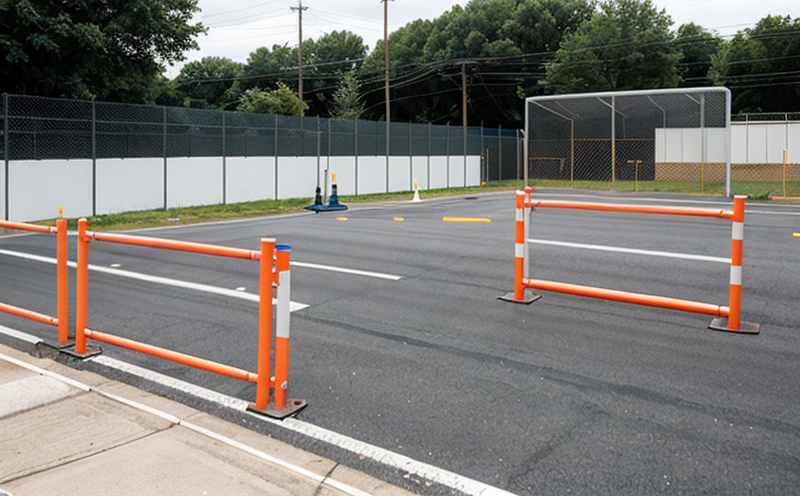EN 170 UV Filter Shields Optical Testing
The European Standard EN 170 specifies the requirements and test methods for personal protective equipment (PPE) designed to protect the eye, face, or head against various types of hazards. Among these is the optical performance testing of UV filter shields used in safety glasses, goggles, and similar protective eyewear.
UV filter shields are critical components that safeguard the wearer from harmful ultraviolet radiation, which can be present in welding arcs, laser beams, or sunlight. Ensuring the optical integrity of these shields is paramount to prevent eye damage and ensure clear vision under hazardous conditions.
The testing procedure outlined in EN 170 focuses on several key aspects:
- Transmission of UV light: The shield must effectively block a specific range of ultraviolet wavelengths, typically UVA (320-400 nm) and UVB (280-320 nm).
- Visual transmissibility: The optical clarity of the shield under specified lighting conditions.
- Color characteristics: The accurate representation of colors as perceived by a wearer using the shield, especially in environments where color discrimination is critical.
The testing process involves precise measurement and evaluation of the optical properties of the UV filter shields. This includes the use of specialized equipment such as integrating spheres for measuring light transmission, spectrophotometers for analyzing color fidelity, and reference standards to ensure consistency across tests.
Compliance with EN 170 is essential for manufacturers of protective eyewear, as it ensures that their products meet the necessary safety and performance criteria. For quality managers and compliance officers, this testing helps in maintaining regulatory compliance and enhancing product reliability.
R&D engineers can leverage these tests to innovate and improve the design of UV filter shields, ensuring they offer superior protection against harmful UV radiation while maintaining optical clarity. Procurement teams benefit from knowing that their suppliers meet stringent standards, which enhances supply chain integrity and trustworthiness.
Applied Standards
The primary standard applied in this testing is EN 170: Personal eye protection against radiant energy. This standard provides a framework for the design, manufacture, and performance of protective eyewear, including UV filter shields.
In addition to EN 170, other relevant standards include:
- ISO/TS 23465: Technical Specification for Personal Eye Protection Against Ultraviolet Radiation
- ASTM F2973-18: Standard Practice for Testing Personal Protective Equipment for Occupational Use Against Ultraviolet Radiation
- IEC 60364-7-44: Electrical installations – Part 7-44: Protection against electric shock – Special requirements for personal protection equipment (PPE) used in occupational environments
The application of these standards ensures that the testing process is consistent and adheres to international best practices. Compliance with such standards enhances the credibility and market acceptance of protective eyewear products.
Customer Impact and Satisfaction
The results of EN 170 UV filter shield optical testing directly impact customer satisfaction by ensuring that the products meet stringent safety standards. This enhances trust in the brand and improves overall product performance.
- Enhanced worker safety: By effectively blocking harmful ultraviolet radiation, these shields protect workers from potential eye damage.
- Improved visual clarity: Ensuring clear vision under hazardous conditions is crucial for maintaining productivity and reducing accidents.
- Increased brand reputation: Compliance with international standards boosts the credibility of the product and enhances market acceptance.
For quality managers, compliance with these tests means they can confidently assure their teams that the products meet all necessary safety requirements. This reduces the risk of non-compliance penalties and improves operational efficiency.
R&D engineers benefit from precise testing data to refine product designs, ensuring they offer superior protection while maintaining optical clarity. Procurement officers gain assurance that their suppliers adhere to stringent quality control measures, enhancing supply chain integrity.
Use Cases and Application Examples
The application of EN 170 UV filter shields in various industries is extensive. These include:
- Welding: Protecting workers from the intense ultraviolet radiation produced during welding processes.
- Laser operations: Shielding personnel from laser beams, which can emit harmful levels of UV light.
- Military and security operations: Ensuring clear vision for soldiers or officers in environments where visual clarity is critical.
In each of these use cases, the optical testing ensures that the shields perform reliably under demanding conditions. This reliability translates into improved safety and performance, ultimately enhancing worker well-being and operational efficiency.





